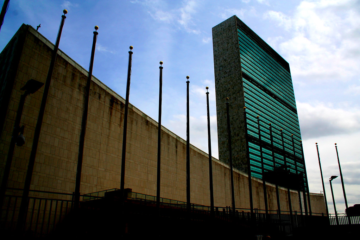In recent weeks, thousands of people in Germany have marched in protest against the AfD (Alternative für Deutschland), the far-right political party whose strong performance in September’s election gave them their first ever representatives in the national parliament. These manifestations not only call into question the legitimacy of AfD, it further questions the foundational principle at the heart of the democratic system in Germany: proportional representation.
Proportional representation is “an electoral system designed to represent in a legislative body each political group or party in proportion to its actual voting strength in the electorate”. This system of government is often thought to be more egalitarian than others, because all the parties are represented in the legislative assembly, in this case the German Bundestag, and all have a say. As such, the people of Germany may feel better represented than those in majoritarian democracies such as the United States or the United Kingdom, where smaller parties are simply not part of political life as they do not weigh in the decision-making process.
However, the example of Germany reveals that proportional representation is not such an ideal form of democracy either. The recent election allowed the AfD to become part of the Bundestag, a situation which many find unacceptable. The recent wave of populism within the landscape of European political parties and the political history of Germany can serve to explain such contestation. Under the Weimar Republic in the inter-war years, a similar system allowed Adolf Hitler to legally come to power in Germany, winning legislative elections, making his way, slowly but surely, into the Reichstag, as the German parliament was called at the time.
This situation questions the core of democracy. The president of AfD has claimed in response to the manifestations that this was “an attack against democracy”. He certainly has some legitimacy in saying this, because the protesters are questioning political pluralism and thus their own political system. The essence of democracy is the government by the people which implies that every citizen has to have a voice. By denying the AfD their voice, the contestation movement is endangering the very institutions that make a pluralistic political landscape possible.
Germany is not the only country concerned by the growing importance of populist parties located at the political extremes. In France, the Front National made its way to the second round of the presidential elections for the second time in less than 20 years. Across the pond, the election of Donald Trump has profoundly transformed American politics. Is democracy flawed and does it need to be adjusted to prevent the possibility of these parties gaining power within their respective countries? Or should the issue by addressed directly at its source, identifying the causes of the growing importance of these parties? For instance, an analysis of the Palma indicator of inequality shows that the rise of populism is correlated to the degree of socio-economic inequalities within the country. It may be that the problem is not democracy or proportional representation as such, but rather a global context of social and economic crises which might explain why people are leaning towards these fast-growing parties which offer a more radical view on politics.


